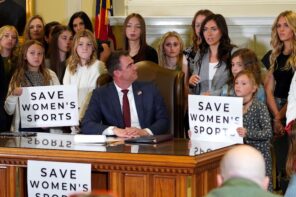Rather than waiting for digital youth to take to social media spontaneously in honor of Pope Francis’ upcoming Philadelphia appearances, a couple of Catholic organizations ran a widely publicized contest to recruit citizen journalists between 18 and 35 to tweet, tumbl, post, vine and pin the papal visit.
But will a hashtag or two be enough to engage my generation?
Like many Latinos in the U.S., I grew up Catholic. Unlike many Latinos, this was my choice rather than my parents’. They wanted me to decide how I expressed my spirituality, so after taking religious studies (I actually did!), I came to the conclusion that I would be Catholic because Jesus was a progressive political figure who helped others in need.
Later in college, I learned about icons of liberation theology like Oscar Romero, the Salvadoran Catholic priest who was assassinated for his opposition to an oppressive military regime. So I have made a deliberate attempt to accept the Catholic Church for what it can be—a compassionate and welcoming sanctuary, especially for the marginalized.
But as a Latina millennial who supports sexual and reproductive rights, I find that the Church’s restrictive attitudes make it very difficult for me to remain a committed Catholic.
My generation cherishes autonomy and individualism and rejects rigid identities and roles. Not surprisingly, a recent study from Pew Research confirmed that millennials are less likely to attend church than those in other generations. More than a third of millennials say they are unaffiliated with any church. In contrast to their counterparts in 1976, twice as many high school seniors reported “never” attending religious services. Similarly, college graduates in the 70s were three times more likely to be religiously involved than their counterparts today. Only 16% of millennials consider themselves Catholic, compared to nearly a quarter of other generations.
A second study, “Generational and Time Differences in American Adolescents’ Religious Orientation,” also noted a decline in religious affiliation and further concluded that young women are the demographic segment driving this shift. The drop among 12th-grade girls who never attend church surged by 125% in the past thirty years, in contrast to the 83% increase among their male peers.
Was this decline inevitable or will millennials (and their children) ever go back to regularly attending mass?
I believe that the Catholic hierarchy’s narrow view on gender and sexuality is a big factor in my generation’s difficulty with the Church. Whereas the Church has taken steps to address other important issues like economic justice and climate change, it still falls short of acknowledging that a broader, more inclusive view of gender roles, sexual and reproductive health, and sexual expression is crucial to the millennial generation.
Laudato si’, the pope’s encyclical on the environment, made global headlines because of its powerful stance against consumerism and its repercussions. Yet, the text falls short of fully resonating with young people’s concerns, resisting policies that protect “reproductive health” (in quotes in the manuscript).
What Pope Francis and his Church fail to understand is that reproductive health and rights are very much an issue of justice for the poor and women of color. Those who have means and want to end their pregnancies are able to go ahead with their decision, but women struggling financially, who are more likely to be young, immigrant, or women of color, often must carry a pregnancy they don’t want and have to seek clandestine and unsafe measures. And a woman who wants to get an abortion but is denied that right is more likely to fall into poverty than one who can get an abortion.
Moreover it is often poor and young women who have to seek abortions because they don’t have the means to raise a child. Hence, access to reproductive care is as much of an issue of social justice as economic disparity or climate change.
Furthermore, our reproductive health is an issue of integrity and autonomy. As millennials are characterized by our independence and open mindedness, the failure of churches to respect this right will mean that fewer of us will feel comfortable within their walls.
Millennials are delaying marriage and finding alternative ways to form families. With a church that establishes rigid limits on how one should create a family, its impositions collide against a major cultural shift that has no signs of slowing down.
The Catholic Church has shown the ability to evolve. When asked about gay priests, Pope Francis famously responded, “Who am I to judge?” and demonstrated an inclination to change his position. In this sense, the Catholic Church also has the opportunity to rethink the way it views young women’s reproductive health. It can declare that it is in favor of allowing women to make informed decisions about when and if to marry, when and how many children to have, and how they will take care of their health.
With such shifts, I hope that newer generations, especially women, will again seek the church out for moral and social support. I believe it can again be that place—represented by a figure like Monsignor Romero—that does not judge those who are most in need.





